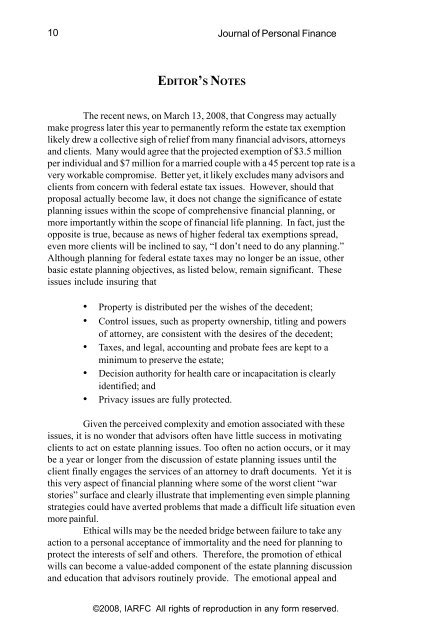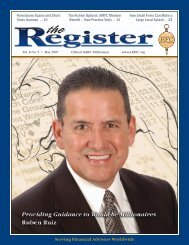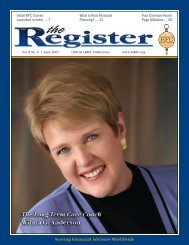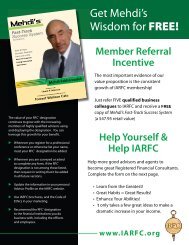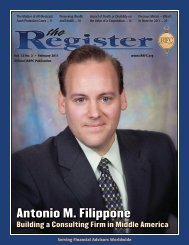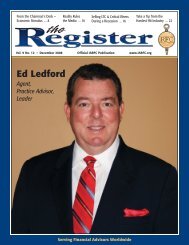3433-vol. 6 issue 2-3.pmd - iarfc
3433-vol. 6 issue 2-3.pmd - iarfc
3433-vol. 6 issue 2-3.pmd - iarfc
You also want an ePaper? Increase the reach of your titles
YUMPU automatically turns print PDFs into web optimized ePapers that Google loves.
10<br />
Journal of Personal Finance<br />
EDITOR’S NOTES<br />
The recent news, on March 13, 2008, that Congress may actually<br />
make progress later this year to permanently reform the estate tax exemption<br />
likely drew a collective sigh of relief from many financial advisors, attorneys<br />
and clients. Many would agree that the projected exemption of $3.5 million<br />
per individual and $7 million for a married couple with a 45 percent top rate is a<br />
very workable compromise. Better yet, it likely excludes many advisors and<br />
clients from concern with federal estate tax <strong>issue</strong>s. However, should that<br />
proposal actually become law, it does not change the significance of estate<br />
planning <strong>issue</strong>s within the scope of comprehensive financial planning, or<br />
more importantly within the scope of financial life planning. In fact, just the<br />
opposite is true, because as news of higher federal tax exemptions spread,<br />
even more clients will be inclined to say, “I don’t need to do any planning.”<br />
Although planning for federal estate taxes may no longer be an <strong>issue</strong>, other<br />
basic estate planning objectives, as listed below, remain significant. These<br />
<strong>issue</strong>s include insuring that<br />
• Property is distributed per the wishes of the decedent;<br />
• Control <strong>issue</strong>s, such as property ownership, titling and powers<br />
of attorney, are consistent with the desires of the decedent;<br />
• Taxes, and legal, accounting and probate fees are kept to a<br />
minimum to preserve the estate;<br />
• Decision authority for health care or incapacitation is clearly<br />
identified; and<br />
• Privacy <strong>issue</strong>s are fully protected.<br />
Given the perceived complexity and emotion associated with these<br />
<strong>issue</strong>s, it is no wonder that advisors often have little success in motivating<br />
clients to act on estate planning <strong>issue</strong>s. Too often no action occurs, or it may<br />
be a year or longer from the discussion of estate planning <strong>issue</strong>s until the<br />
client finally engages the services of an attorney to draft documents. Yet it is<br />
this very aspect of financial planning where some of the worst client “war<br />
stories” surface and clearly illustrate that implementing even simple planning<br />
strategies could have averted problems that made a difficult life situation even<br />
more painful.<br />
Ethical wills may be the needed bridge between failure to take any<br />
action to a personal acceptance of immortality and the need for planning to<br />
protect the interests of self and others. Therefore, the promotion of ethical<br />
wills can become a value-added component of the estate planning discussion<br />
and education that advisors routinely provide. The emotional appeal and<br />
©2008, IARFC All rights of reproduction in any form reserved.


